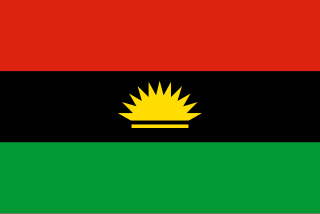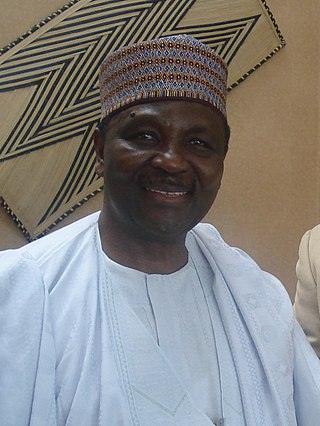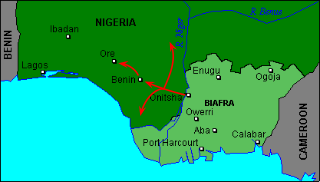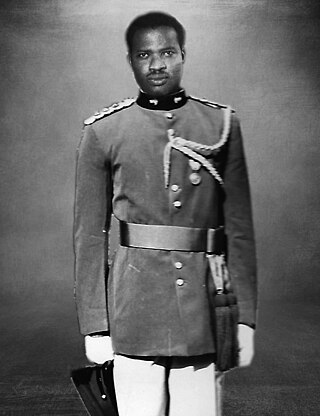
Biafra, officially the Republic of Biafra, was a partially recognised state in West Africa that declared independence from Nigeria and existed from 1967 until 1970. Its territory consisted of the former Eastern Region of Nigeria, predominantly inhabited by the Igbo ethnic group. Biafra was established on 30 May 1967 by Igbo military officer and Eastern Region governor C. Odumegwu Ojukwu under his presidency, following a series of ethnic tensions and military coups after Nigerian independence in 1960 that culminated in the 1966 anti-Igbo pogrom. The Nigerian military proceeded in an attempt to reclaim the territory of Biafra, resulting in the start of the Nigerian Civil War. Biafra was officially recognised by Gabon, Haiti, Ivory Coast, Tanzania, and Zambia while receiving de facto recognition and covert military support from France, Portugal, Israel, South Africa and Rhodesia. After nearly three years of war, during which around two million Biafran civilians died, president Ojukwu fled into exile in Ivory Coast as the Nigerian military approached the capital of Biafra. Philip Effiong became the second president of Biafra, and he oversaw the surrender of Biafran forces to Nigeria.

Chukwuemeka "Emeka" Odumegwu Ojukwu was a Nigerian military officer and politician who served as President of the Republic of Biafra from 1967 to 1970 during the Nigerian Civil War. He previously served as military governor of the Eastern Region of Nigeria, which he declared as the independent state of Biafra.

Yakubu Dan-Yumma "Jack" Gowon is a Nigerian former Head of State and statesman who led the Federal military government war efforts during the Nigerian Civil War.

The military dictatorship in Nigeria was a period when members of the Nigerian Armed Forces held power in Nigeria from 1966 to 1999 with an interregnum from 1979 to 1983. The military was able to rise to power often with the tacit support of the elite through coup d'états. Since the country became a republic in 1963, there had been a series of military coups.

David Akpode Ejoor RCDS, PSC, was a Nigerian military officer who served as Chief of Army Staff (COAS).

The fall of Enugu was a military conflict between Nigerian and Biafran forces in September and October 1967 during the Nigerian Civil War which centered around Enugu, the capital of the secessionist Republic of Biafra. Nigerian federal forces had made Enugu's capture a priority shortly after war broke out, but their advance stalled at Nsukka. Biafran president and leader Odumegwu Ojukwu, attempted to distract the Nigerian Army by initiating an invasion of Nigeria's Mid-Western Region in August, but the offensive was brought to a halt. Lieutenant Colonel Theophilus Danjuma took charge of the Nigerian forces at the Nsukka front and prepared to advance on Enugu with seven battalions of the 1st Division. Enugu was garrisoned by one brigade led by Colonel Alexander Madiebo and poorly armed civilians called into service. Danjuma decided to launch an offensive with his forces spread over a broad front to make it more difficult for the Biafrans to block them along major roads as had happened up to that point.
The Operation UNICORD was an offensive launched by the Nigerian Army at the beginning of the Nigerian Civil War. It involved the capture of 6 major Biafran towns near their northern border.
Operation Tail-Wind was the final military conflict between Nigeria and Biafra. The operation took place in the towns of Owerri and Uli, both of which were captured by Nigerian forces. The operation ended with General Odumegwu Ojukwu fleeing to the Ivory Coast and then president of Biafra Philip Effiong surrendering to Olusegun Obasanjo.

The Midwest Invasion of 1967 codenamed Operation Torch, was a military operation between Nigerian and Biafran military forces during the Nigerian Civil War. The invasion began on August 9 when 3,000 Biafran soldiers led by General Victor Banjo crossed the River Niger Bridge into Asaba. Upon reaching Agbor, the Biafrans split up. With the 12th Battalion moving west capturing Benin City and Ore, the 18th Battalion swung south, taking Warri, Sapele and Ughelli, while the 13th Battalion headed north for Auchi, Agenebode and Okene. Simultaneously, a plot to capture Mid-Western Governor David Ejoor at his home in Benin failed. Nevertheless, the Biafrans, meeting virtually no resistance, had seized the entire Mid-Western Region in less than 12 hours.
Victor Adebukunola Banjo was a colonel in the Nigerian Army. He fought in the Biafran Army during the Nigerian Civil War. Banjo was accused of being a coup plotter against Nigerian Prime Minister Abubakar Tafawa Balewa by the government of Aguyi Ironsi. He was alleged to have staged a coup plot against Biafran President Odumegwu Ojukwu and was executed as a result. Ojukwu's first military judge stated that was not enough evidence to convict him of coup charges, but he was found guilty by a second military tribunal.
Timothy Onwuatuegwu was a Nigerian military officer and later a Major in the Biafran Armed Forces. He was a leading military figure in the Nigerian Civil War and a participant in the 1966 Nigerian coup d'etat.
On 15 January 1966, rebellious soldiers carrying out a military putsch led by Kaduna Nzeogwu and 4 others, killed 22 people including the prime minister of Nigeria, many senior politicians, senior Army officers and their wives, and sentinels on protective duty. The coup plotters attacked the cities of Kaduna, Ibadan, and Lagos while also blockading the Niger and Benue River within a two-day timespan, before being subdued. The General Officer Commanding the Nigerian Army, Johnson Aguiyi-Ironsi, was falsely accused of having been compelled to take control of the government of a country in upheaval, inadvertently putting Nigeria's nascent democracy on hold His ascendancy to power was deemed a conspiracy by the coup plotters, who were partly Igbo and Majors from Yoruba and Hausa sub regions, to pave the way for General Aguiyi-Ironsi to be head of state of Nigeria. Consequently, the retaliatory events by Northern members of the Nigerian Army that led to deaths of many Igbo soldiers and civilians put the nation on a path that eventually led to a civil war.
Emmanuel Arinze Ifeajuna was a Nigerian army major and high jumper. He was the first Black African to win a gold medal at an international sports event when he won at the 1954 British Empire and Commonwealth Games. His winning mark and personal best of 6 ft 8 in (2.03 m) was a game record and a British Empire record at the time.
Christian Anuforo was a Nigerian Army major and one of the principal plotters of the 15 January 1966 coup, an event that derailed Nigeria's nascent democracy and introduced military rule to Nigeria.

Ogbugo Kalu was a Nigerian military officer who served in the Nigerian Army and later the Biafran Army during the Nigerian Civil War. Kalu was also commander of the Nigerian Military Training College (NMTC) in Kaduna following the 1966 Nigerian coup d'état.

Igbo nationalism is a range of ethnic nationalist ideologies relating to the Igbo people of southeastern Nigeria. While the term is defined as seeking Igbo self-determination by some, others argue that it refers to the preservation and revival of Igbo culture and, for others, the development of Igboland stemming from the philosophy, Aku luo uno, which means "wealth builds the home".
Humphrey Chukwuka is a retired Nigerian Army Major, former Biafran Army Colonel, and one of the principal plotters of the January 15, 1966 coup, an event that derailed Nigeria's nascent democracy and introduced military rule to Nigeria.

Ejike Ebenezer Obumneme Aghanya was a military officer and electrical engineer who served in the Nigerian Army and the Biafran Armed Forces, retiring as a colonel. Accused of involvement in the 1966 Nigerian coup d'état he was arrested and imprisoned without trial until the outbreak of the Nigerian Civil War where he served on the side of Biafra, holding key positions in the Biafran Armed Forces. He was the head of the Biafran Agency for Research and Production (RAP) which produced bombs, rockets, missiles, as well as ammunition, armored vehicles, telecommunication gadgets and petroleum refineries among others for the Biafran Armed Forces. Later he was the Chief of Staff of the Biafran Organisation of Freedom Fighters (BOFF) which was the guerrilla warfare and special operations arm of the Biafran Armed Forces. He also served as Battalion Commander, 44th Electrical and Mechanical Engineer Battalion Biafran Army and later Brigade Commander of the 58th Brigade of 12th Infantry Division Biafran Army during the war.
Alexander A. Madiebo was a Biafran soldier. He served as the General Officer Commanding (GOC) of the Republic of Biafra which existed from 1967 to 1970.








